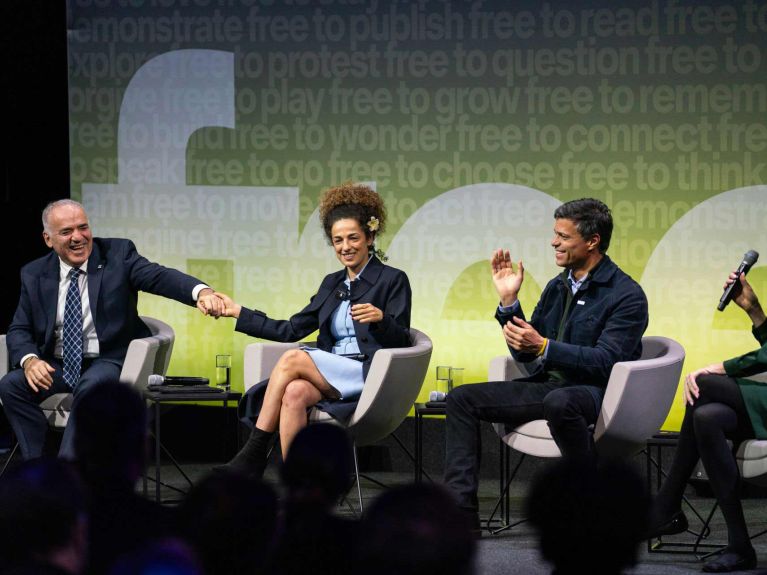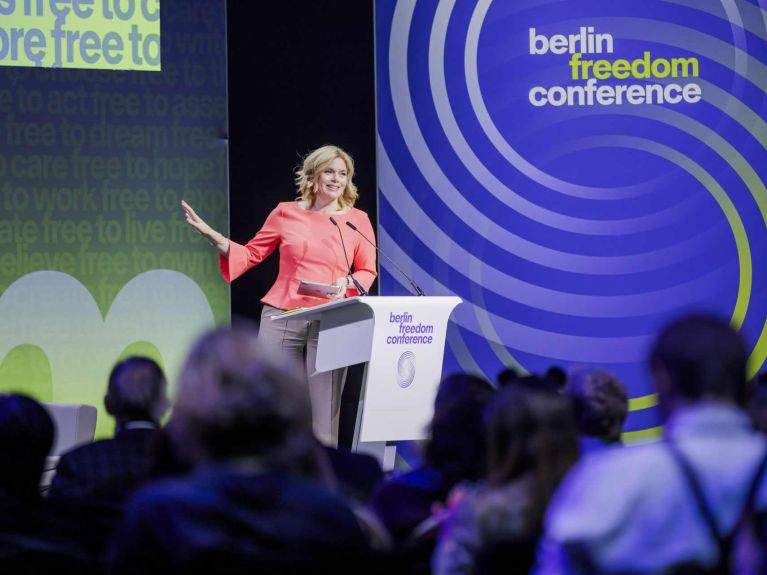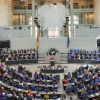Global Alliance for Democracy
The inaugural Berlin Freedom Week brings together people from around the world who are committed to freedom and democracy.

Democracies worldwide are in decline and Leopoldo López knows why that’s the case. “Autocracies are organising into a global network. Their sole aim is to destroy the West along with its liberal values.” The former Mayor of Caracas has experienced how his homeland Venezuela increasingly came under the influence of Russia and China. In 2014, he led a protest movement that fought against criminality, inflation and repression. He was arrested and spent seven years in prison. Now he says: “Anyone wanting to defend freedom and democracy must be globally networked.”
This has led López and other political dissidents from around the world to Berlin. The first ever Berlin Freedom Week is taking place there from 8 to 15 November 2025. It is an initiative for freedom and democracy on the occasion of the 36th anniversary of the Fall of the Berlin Wall. Over 130 events at 80 locations will see the German capital host conferences, film screenings and workshops that are intended to bring freedom fighters into dialogue with each other and with stakeholders from politics, business, academia, science and culture.
The World Liberty Congress met in Berlin’s House of Representatives on 8 November to launch Berlin Freedom Week – a parliament of its own comprising some 200 dissidents sent as delegates of opposition movements in more than 50 autocratically ruled countries. It was founded in 2021 by López together with Iranian journalist and women’s rights activist Masih Alinejad, and Kremlin-opponent and former world chess champion Garry Kasparov. The general meeting in Berlin also provided an opportunity to elect a new executive committee – an important symbolic step for the members. “We wanted to show that this is how democracy works. We relinquish responsibility. We don’t act like the regimes in our countries”, explained Alinejad.
Berlin Freedom Conference: Preserving democratic values
The uniqueness of this global community was perceptible at the Berlin Freedom Conference on 10 November – the main event of Berlin Freedom Week. It was an intense day, packed with panels and workshops relating to the core issue: How can democracies better protect their inherent values? How can their global decline be stopped? More than 1,000 participants – including some 130 dissidents representing politics, business and media – came together, and around 60 speakers from around the world provided significant momentum. In addition to López, Alinejad and Kasparov, other speakers included Nobel Peace Prize laureates Oleksandra Matviichuk and María Corina Machado, Taiwan’s digital ambassador Audrey Tang and Ben Hodges, former commanding general, United States Army Europe.
Two-thirds of the activists present had to endure prison sentences in their countries; they experienced violence and, in some cases, torture. Yet they didn’t give up, but rather fought for democratic values with total commitment. “We were and are threatened by the regimes in our home countries, but we don’t see ourselves as victims. We see ourselves as freedom fighters, as defenders of democracy”, says López.
“Because we have to fight”, as among others Garry Kasparov frequently emphasised at the conference. Democracies have been in global decline for almost 20 years; around 70 per cent of the world’s population now lives under autocratic regimes. “Many people continue to be insufficiently aware of the danger facing the West’s liberal values model”, says Mantas Adomėnas, Secretary General of the Community of Democracies. He warned against the illusion of democratisation as a sure-fire success, which he also described as “optimistic fatalism”: “We thought for too long that history is on our side. That everything would turn out fine despite all the challenges. We must urgently disabuse ourselves of this attitude.”
Media attention, new narratives
So what is to be done? The activists in particular had a clear message in this respect: Repeatedly and tirelessly point out grievances and injustices. This is how Carine Kanimba was able to release her father Paul Rusesabagina from imprisonment. Rusesabagina was a hotel manager who saved thousands of people’s lives during the genocide in Rwanda by offering them refuge from the militias. His story served as a template for the multi-award-winning film “Hotel Rwanda”. He subsequently became a fierce critic of the Rwandan government under President Paul Kagame and was sentenced to 25 years imprisonment in 2020. Another example is Evgenia Kara-Murza who tirelessly campaigned for her husband, Russian opposition politician, human rights activist and journalist Vladimir Kara-Murza, who was released in August 2024 during a prisoner exchange. Carine Kanimba and Evgenia Kara-Murza met at the conference and embraced each other on stage – joined by those who they had rescued from custody.
Pure media attention is one thing, but the critical questioning of narratives appears to be another important step. “There are more and more people who think that democracy is some sort of cultural privilege. And that certain countries are not yet ready for it”, López feels. “But that is incorrect. I can tell you: people overall in the world want to be free. Quite simply because freedom is a basic human need. And the only opportunity to be really free is in a democratic society.”

Berlin: Headquarters of a global democracy movement
Yet the challenges are not merely external. Democratic systems themselves must also rethink their political practises, emphasised Julia Klöckner, President of the German Bundestag. Klöckner believes that decisions need to be more transparent: “Voters have a right to understand how decisions are reached and how the different interests were weighed up. Trust is built through reliability and transparency.”
Berlin Freedom Week and its keynote conference are to take place again in Berlin in 2026 and become an established event. López sees this city as the ideal headquarters for the global movement he helped to form. “People in Germany commemorate the fall of the Berlin Wall as something historical. We see that as the present. Our fellow combatants in the World Liberty Congress all live in their own East Berlin. And they’re working hard to ensure that the wall in their countries also falls.”
Berlin Freedom Week
Berlin Freedom Week is an initiative of the Berlin tourist agency visitBerlin, the Axel Springer Foundation, the World Liberty Congress, the Berlin Commissioner for Reappraisal of the SED Dictatorship and the Robert Havamann Gesellschaft. It is taking place for the first time in 2025 and is intended to bring German and international guests together to discuss the importance of democratic values in today’s world.
The Berlin Freedom Conference
The inaugural Berlin Freedom Conference took place on 10 November 2025 as the keynote event of Berlin Freedom Week and brought together leading stakeholders from politics, business, civil society, culture and media to jointly establish new democratic alliances and advance the global commitment to freedom and democracy.

